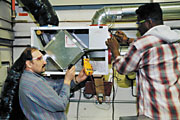
Taking night classes is not a new or unique way to earn a degree. The convenience of taking courses after the regular 9-5 hours has been a benefit for many college students. But with most programs, the only option is taking one or two courses at night, not completing your whole degree.
So why not? That is the question hvac instructors at Hennepin Technical College in Minneapolis, MN, have asked.
In August of 1999, Hennepin started its Hvac Night Program, which allows students to take and complete their entire two-year hvac program at night. The idea doesn’t seem like a new or unique move, but Hennepin hvac instructor Tim Bro says he knows of no other hvac school in Minnesota that has taken this same step.
So far, instructors and students are pleased with the outcome of the program. Many individuals who would have not had the option to enter the field are now getting the opportunity. It has also tapped into a new demographic of students, and has shown that recruiting could be as simple as making training more readily available.
Working People
For many people who would like to change their career path, it can be a difficult route when juggling classes and trying to make a living.“I had a lot of calls from people who worked days,” says Bro about why Hennepin decided to start the night program. He explains that the typical student in the night classes are individuals who want to enter hvac or a related mechanical service field, but must work to support a family.
He also says that the night classes have tapped in to a demographic of nontraditional students. Bro describes them as typically 25 to 30 years old, married, and who have been in a manufacturing or warehouse-type job. They are also people who want to enter a professional career that they can stay with until retirement.
For example, Ron Totman decided to get involved with the courses after deciding on a bit of a career change. Totman currently works for the post office, but would like to join its maintenance division.
The course availability “fits in with my work schedule,” Totman said. “And it’s not real inconvenient.”
Other students, like Todd Kappes, 19, desire to further their education but can’t find the time around their current jobs. Kappes is a full-time director of maintenance at a nursing home. “I’m getting background experience for the job I’m at now,” Kappes said about taking the course. “I’m also looking at service work as a possible career.”
Kappes also says he has a new daughter, so working part-time and taking classes is not an option. “If you can work during the day, that helps. I have to work during the day or I’d never be able to do this.”
Taking Off
According to Bro, the program has been a great success. When the course started in August 1999, the maximum 24 students were enrolled, with a 12-person waiting list. For the August 2000 session, the class was filled by June.Bro says he was surprised by the outcome. Although he knew there were individuals interested in taking the night course, he thought the program would develop over time, not take off right away.
“The first time we ran the program, we didn’t have time for publicity, but filled it with a 12 person waiting list. This is a good success story for us,” Bro said.
Flexibility, Benefits
Through Hennepin’s hvac program, students have a few options. After the first two semesters, students choose whether to pursue a residential hvac diploma or move to Hennepin’s Eaton campus to pursue a commercial diploma. There is also the option of taking classes to earn an Associate’s in Applied Science (AAS) degree in hvac.Whichever way students decide to go, Hennepin is trying to make the opportunity as flexible as possible. Lectures are scheduled Monday through Thursday from 5 to 7 p.m.
There are also mandatory labs four days a week, but the students have their choice of which lab time to take. They can choose from the 3 to 5 p.m. lab before lecture, or the 7 to 9 p.m. lab after lecture.
Friday is considered open campus day with no scheduled classes or lectures.
“If a student needs additional help, they can come on Friday and work one-on-one with an instructor or get caught up,” Bro explains. He also says that those students who are caught up with their work can consider Friday a free day.
“With open campus Friday, we rarely lose the frustrated students who fall behind and drop the course because they feel they cannot keep up,” Bro said.
Publication date: 12/18/2000


Report Abusive Comment